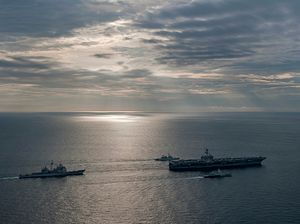This week, Malaysian media picked up on a public suggestion of an idea that Malaysia follow other South China Sea claimants and interested parties and rename its part of the South China Sea. Though the discussion of an old idea might be read as part of an ongoing contemplation of tougher moves within the Southeast Asian state regarding its South China Sea, it would be in stark contrast to the cautious, calibrated approach that the Malaysian government has tended to adopt on the issue as well as in its relationship with China more generally and belie the broader challenges evident in its approach.
As I have noted before, Malaysia’s traditional South China Sea position under the government of Prime Minister Najib Razak might be best summed up as a “playing it safe” approach designed to preserve its interests as well as to manage its close ties with China (See: “Playing it Safe: Malaysia’s South China Sea Approach”). Though we have seen somewhat of a hardening of Malaysia’s position over the past few years – from tougher rhetoric by politicians to more regular patrolling of its waters – the overall approach itself has not fundamentally changed and other tougher moves have not been adopted, for reasons that have long been evident (See: “Malaysia’s South China Sea Approach After the Arbitral Ruling”).
Discussion of renaming parts of the South China Sea is far from something new in the region. Indeed, if Malaysia does choose to rename its part of the South China Sea, it would also be just the latest in a succession of such designations we have witnessed among Southeast Asian states. The two other main Southeast Asian claimants in the South China Sea, the Philippines and Vietnam, already call the South China Sea the West Philippine Sea and the East Sea respectively. And, last year, Indonesia, which is technically not a South China Sea claimant but is nonetheless an interested party, announced that it would now call it the North Natuna Sea (See: “Why Did Indonesia Just Rename its Part of the South China Sea?”).
But in the context of Malaysia’s own approach, if Malaysia were to actually seriously move toward such a renaming, it would be read as yet another example of a gradual hardening of its position, albeit quite a bold one relative to previous examples we have seen (and ones that were proposed but not adopted by the Najib government). Though the specifics take quite a bit of working out as we have seen in other regional cases and it is unclear what exactly that name would be – the suggestion given by a lecturer that made headlines this week was “Malaysia Raya Sea” – it would nonetheless represent quite a change from its current approach.
The renaming would also no doubt send a strong signal that Malaysia is willing to take bolder steps to reinforce its long-held position that it does not recognize China’s notorious nine-dash line claim. Of course, this would partly be interpreted as Malaysia looking to strengthen its claim to the energy resources that lie beneath its continental shelf and its ability to take other moves to reinforce its claims such as patrolling waters. But assuming that Malaysia moves forward with steps like registering the new name with the International Hydrographic Organization, the move would be additionally significant since it would underscore the fact that Malaysia is ensuring that its actions are aligned with international law.
That said, it should be noted that Malaysia has thus far has shown few signs of moving forward with such bolder actions. Apart from the practical realities of such a name change, though Malaysia has hardened its South China Sea policy somewhat over the past few years, this change has been carefully calibrated, and renaming would nonetheless mark quite a departure from its traditional “playing it safe” South China Sea policy. It would also be a departure from the usual aversion of the Najib government to provoking China on this issue that could hamper progress on other aspects of Sino-Malaysian relations.
That does not mean one should rule out the possibility of Malaysia taking some tougher moves on the South China Sea issue further down the line. When asked previously about a list of actions that might be deemed to be part of a harder line on the South China Sea, some Malaysian government officials have said that though these may not be feasible now, they could be in the future as China increases its militarization of the South China Sea. If that indeed occurs, Malaysia would move more in the direction of another example of a Southeast Asian state pushed towards a tougher South China Sea policy by Beijing’s actions, rather than one that is wary of provoking it despite the fact that Beijing does not display the same caution in its own dealings.
Finally, it is worth noting that as significant as this move would be, such legal maneuvers themselves are unlikely to stop Chinese assertiveness towards countries like Malaysia. As the arbitral ruling on the Philippines’ South China Sea case against China illustrated, legal moves need to be paired with actions in other areas as well, including in the military and economic realms, if they are to be enforced and Beijing is expected to comply with them (See: “US South China Sea Policy After the Ruling”).
And therein lies Malaysia’s real challenge which such discussions of new ideas often leave out: though it may be on firm ground with legal moves like these, the country’s military capabilities remain quite limited, and the Najib government would be hesitant to take moves like significantly restrict economic activity with Beijing (See: “Assessing Malaysia’s Coast Guard in ASEAN Perspective”). Yet these are exactly the kind of moves that would make name changes more than just symbolic acts of protest.
































